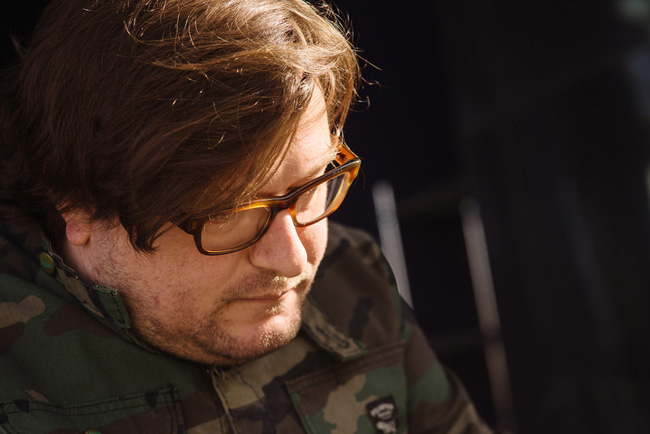
Back in the glory days of the original Porter & Frye in Minneapolis, I lucked into being on the receiving end of an 8-course tasting menu cooked and served by Erik Anderson. We had a mutual friend who arranged it. It was one of those phenomenal meals that becomes a benchmark for future experiences — refined, playful, confident, and just really damn good. A highlight was a seemingly perfectly machined cylinder — it looked like a next-generation energy source, or maybe something Superman would insert into an ice crystal at his Fortress of Solitude. It turned out to be maple ice cream wrapped in a thin layer of frozen foie gras. Erik explained the agonizing process to me, which I didn’t fully understand, and seemed to involve industrial materials and an inordinate amount of man-hours. All I knew is that it was delicious.
Over the years, Erik and I struck up a casual friendship. I’m a musician, he used to tour-manage punk bands (Alkaline Trio, among others), and we both love talking about food. Sometimes we’d meet up for beers at the CC Club and talk about why “house-made” ketchup universally sucks, and say that Heinz can’t be improved upon.
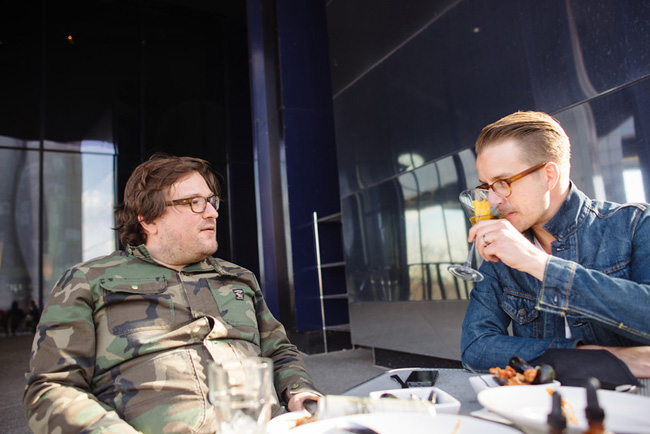
Since then, Erik has become an award-laden, capital-C Chef. After a successful stint in Nashville that saw him open the highly acclaimed Catbird Seat, he’s back in Minneapolis to open a new restaurant, get married, and maybe even settle down a bit after traveling the world mincing shallots with the likes of Rene Redzepi and Thomas Keller. We sat down to chat at his former restaurant, Sea Change, to drink and eat oysters on one of the first sunny days of Spring, and to talk about stuff.
ERIK: So how was the tour?
PETE: Tour was good. It’s always such a strange thing to be gone and come back — the adjustment period is odd. You spend weeks with a specific itinerary, and you come home and have to manage your own time again. How did your pop-up dinner go at Borough?
ERIK: It was good! It sold out, it was super awesome — it was a lot of fun. I’ve got some photos somewhere [pulls out phone]… yeah, people were into it, I was really pleased.
PETE: It went smoothly?
ERIK: Yeah, super smooth — Nick, from Borough, was there to help me, and this kid Alex who works there. It was awesome. I don’t know if I’ll do another super fancy one until the restaurant opens — whenever that is — but me and Bill Summerville are trying to find a place to do fried chicken and champagne — you know, that’s it. Super casual. We want something that’s ideally closed at night, you know, a regular thing like every Sunday night or something. So it’s finding a place that’ll let us use their space and their liquor license. There’s a couple places we’ve hit up. I think that’d be a good time.
PETE: So have you found a location for your new restaurant yet?
ERIK: We’ve looked at a few locations. It’s fun, but it’s frustrating — I like going to look at spaces. You get to see, in your mind’s eye, what it could be, which is fun, but at the same time I just want to get started, get cooking. There’s a couple of cool buildings — one I really like just over the river in NE, and a couple in the North Loop I really like. Some of them are historic properties that are in need of repair, and some you walk into with your architect, and it’s like a year-and-a-half project, minimum.
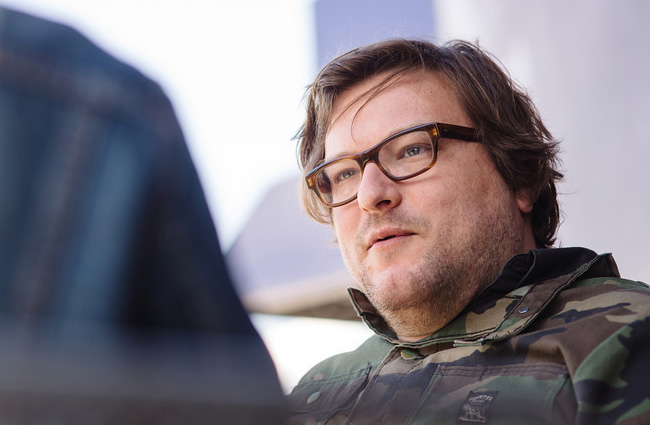
It’s fascinating to me — diving into this, looking at all these spaces, spending time with my real estate guy and an architect — you learn shit that I had no idea about before. Now I know everything that’s for sale around here, which is kind of awesome. David Shea, who’s going to be helping us, is like a genius — he walks into a building and he’s like “this is a certain type of rock from a specific quarry, used from 1910-1930” or something … and a lot of these old buildings have this type of rock that was thought to be super solid and secure, but over the years it turns out it just turns into sand, and crumbles away. It’s crazy. So when you go in, you’ve got to redo so much shit, tuckpoint the brick, whatever.
PETE: So you’re developing a second career as a building materials expert.
[Jaime Malone, the Chef de Cuisine at Sea Change and Erik’s fiancee, shows up at the table with food]
ERIK [TO JAIME]: That was really good. What was that, kimchee and smoked something?
JAIME: Yeah, fennel kimchee and smoked mayonnaise.
ERIK: That was really good.
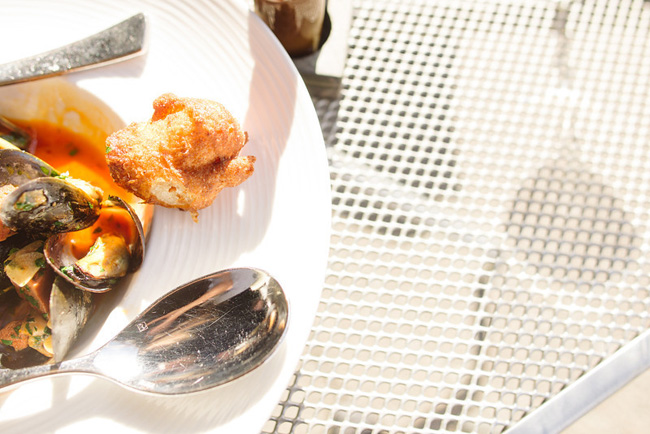
ERIK [TO PETE]: So you know, it’s fun [looking at buildings]. I gotta take a picture of this [takes photo of food]. It’s interesting to look at spaces. But on the other hand, I’m really ready to just start fucking cooking.
PETE: Sure. So you’re starting to feel frustrated a bit, like you just want to get this going?
ERIK: Definitely. But you also don’t wanna make the wrong moves.
[Some fancy pretzels and cheese sauce identified as Velveeta come out]
PETE: These are amazing. Super good. Nothing better than Velveeta!
ERIK: I agree. So where’s the first place you go eat when you get home from the road?
PETE: That’s a good question. I had a crazy sushi crave when we got back — some of the guys in the Messersmith band are big sushi heads — so me and my wife went to Fuji Ya and gorged.
ERIK: Nashville was horrible for sushi. Nothing good. But here… I like Origami a lot, Masu is great.
PETE: We also went to Meritage recently during Restaurant Week… it was great. Stretched out for a few hours and had a long dinner.
ERIK: It’s been a long time since I’ve been there. I gotta go back. They’re getting ready to open their new place [Brasserie Zentral], right?
PETE: Yeah, I think so. Sometime soon. We had a great skate entree at Meritage.
ERIK: I love skate. You know who had a great skate dish was Isaac Becker when La Grassa opened… super simple, classic, just skate with brown butter. So good. I love living over there… walk over to Black Sheep or Be’Wiched. I usually go to Be’Wiched three times a week for sandwiches.

PETE: Speaking of places I want to go when I come home… Icehouse lately has been just killing it with their food. They’re doing such a great job of pulling off so many things… the music, the bar, the food. It’s getting really consistent. On point. Recently had a small plate of lobster ravioli; so good. All the sandwich pedigree from Be’Wiched is there too.
ERIK: Dude my favorite is that poached chicken sandwich. I think it’s the sleeper — no one ever gets it.
PETE: I’ve never had it.
ERIK: It’s amazing. It’s like confited chicked thighs, havarti, and fuckin’ mustard… it’s the one I get all the time. Like, pastrami’s good and everything, but that chicken. Man.
PETE: My other go-to sandwich in town is at Clancey’s… so good.
ERIK: That neighborhood is pretty cool over there — Tilia’s great. The turkey burger there is awesome.
PETE: The jerk chicken thighs.

ERIK: Yeah. Everything’s good there. That neighborhood is awesome. There’s a couple spots I know people are looking at, open spaces… I think Steven [Brown] was kind of the first one.
PETE: He knocked it out of the park with that place.
ERIK: It’s fucking insanely busy.
PETE: And so tiny. So maybe it’s time for me to ask some more “interviewy” questions. Ready for this? I hate all the typical interview stuff… and you’ve gone through the wringer a million times, like “So what’s your favorite food?”
ERIK: I know, it’s like man… are you really asking me that question? [laughs]
PETE: It’s like when people ask, when we’re on the road, “what do you sound like?” or “who’s your biggest influence?” Such a bummer! So… with all the stuff that’s been happening in Minneapolis the past few years, what kind of niche do you want to carve out for your new place?

ERIK: That’s a good question. The hard part is trying to figure out something that’s timeless, something that lasts, you know? I mean there’s so much food… I mean, you know, food, music, pop culture — everything changes and evolves. Trends, fads, etc. Trying new things, seeing what does or doesn’t work, and eventually you understand what makes you happy. And for me that’s something classic and timeless. I think my food will always have that modern approach, plating-wise. But I think I want to get back to some more technique-driven food, classic technique. And newer techniques, but stuff that works. You know? I think young people are opening new restaurants just because people are throwing money at ‘em, and I don’t know if that’s necessarily the smartest thing… you know? Sometimes I walk into a restaurant and I can feel like it won’t be here in five years… It’s like you’re opening a book and recreating something that you’re reading about.
PETE: Right. You could equate that with something like hearing the latest buzz band, and feeling like they’ve got no staying power beyond the moment.
ERIK: Right. Or you’re following a trend that’s gonna be dead soon. Noma, which is an incredible place, you know — it’s fucking amazing — but the reason Noma works is because of where it’s at. The location. You can’t recreate that anywhere else. You can try to, but it won’t work. You’ve got to find your own niche. [Editor’s note: Anderson staged at Noma]
PETE: Right. It’s very specific to its geography.
ERIK: Yeah. And people think just because René [Redzepi] put a book out, it means anyone can cook all that stuff… you can’t. It’s very specific to its time and place. I think everyone’s guilty of that, though…
PETE: Right, the dissociative element of something not quite being of its place, its culture — that clash seems to never turn out well.
ERIK: It’s a really, really difficult thing to find your own niche, I think. Your own way of cooking. I’m not saying I have, I don’t think I have… it’s so easy to take that other route. But to keep yourself on track, to dig in and really explore food, and what you would want to be your food, your cuisine — what kind of mark you wanna leave — it’s a difficult thing. Because you can always do the fuckin’ horse and pony show, it’s not hard to do that.
PETE: The so-called “smoke & mirrors,” sure…
ERIK: Yeah, it’s not gonna last, it’s not genuine.
PETE: So how does that inform what you’re going to be doing, back here in Minneapolis, after you’ve been around? Seems like you’ve seen food through all sorts of lenses, all kinds of contexts, how things work or how they don’t. How do you bring what you feel would be an authentic yet challenging experience back here?
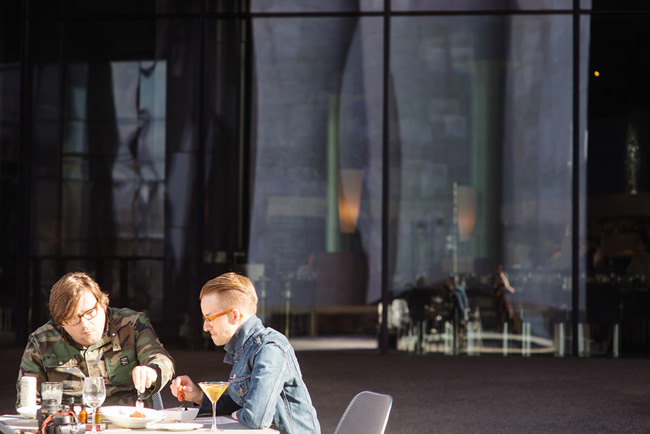
ERIK: I’d like to have more cooks in the kitchen again… at the last place [Catbird Seat], you know, we had two guys. I miss the element of teaching. Teaching young cooks things, watching young people grow as they cook. I miss that aspect of the job. So definitely more of a learning environment, more technique focused — there’s so many people, you know, kids who come out of school, who wanna go work at Alinea or something, and it’s like… you don’t even know how to braise something. Cooking isn’t putting a piece of meat in a bag and setting the temperature on the sous vide machine, you know? That’s one aspect of it, but can you cook that meat to the same temp over a fire, over embers, or in a pan? That’s where the skill is, and that’s what I think a lot of people are losing at a rapid pace… there’s nothing wrong with those techniques, there’s nothing wrong with it, but you’ve gotta remember where everything came from. You’ve gotta be able to have a concept, a grasp of it, before you dive into those techniques.
PETE: You’ve got to know why you’re doing it.
ERIK: Right! For sure. So it’s kind of upsetting to see these kids throwing a bunch of powders and shit, you know, sealing bags, with no reason or idea of why they’re doing it. Because they saw Grant Achatz do it. I mean Grant has a huge knowledge of cuisine, in classic food, you know? You can’t just suddenly be that person. It takes years to get to that level. And it takes a skill that 99 percent pf people don’t have, or never will have.
PETE: Seems to me that that’s a particular quality of just being young.
ERIK: That’s exactly what it is.
PETE: It’s so applicable to so many things — kids in a band who are convinced, you know? I remember being in a band when I was 18, and thinking that a label was totally going to be knocking on our door. And I listen to those recordings now, and it’s like oh my god, so embarrassing. But you don’t know it at the time!
ERIK: Right! I look at pictures of food I did like, fuck, years ago, even just three years ago, and I’m super embarrassed.
PETE: Really?
ERIK: Oh yeah! But you know, on the other side of this coin are the old guys who refuse to change. You know what I mean? I think it’s a fine line, a balance — food changes and evolves and it grows, and you’ve got to be able to go with that, you know. But then you’ll have these guys who refuse to accept that. That’s equally as frustrating.
PETE: To get stuck, sure. Seems like a fine line for any creative professional to walk. You fear both getting stuck in your ways, in what you already know, and you fear having to constantly learn too.
ERIK: It’s a hard thing, being willing to open your arms to new ideas and new things but still try to make your own way. It’s a difficult thing to navigate. I meet very few people… I mean, who has their own cuisine, you know? I would say René Redzepi — Noma — that’s his food, that’s something he developed, and Ferran Adrià before him, was truly original. Or Thomas Keller. These are just a few people. There are thousands of people cooking, and it’s like, you know — “This is my food,” and I’m like, well, I don’t know…
PETE: The parallels to any art form are there, for sure. And I guess I’m equating cooking to art here, but it’s interesting in a different way, because you can whittle it down to its basic purpose which is just to feed people.
ERIK: Yeah, it is, but you can also go the other way — it’s weird, because this art you create is just something people are eating, you know? You can spend all day painstakingly making something, and it’s gone in three minutes, you know?
PETE: I think about that all the time when it comes to music, or film or TV — like when you rip through a whole season of something on Netflix.

ERIK: Exactly. Actually, when people ask me what I do now, that’s what I say: I binge-watch Netflix. They expect an answer like “I’m working…” but no, I’m watching Netflix [laughs].
PETE: Right, like watching the entirety of Breaking Bad in two days while eating Doritos on the couch.
ERIK: I love that, though. Me and Jaime — she had not seen Game of Thrones, and we watched all the episodes in like a few days — all of them.
PETE: It’s the greatest. But that sense of things freaks me out sometimes — think of the resources, the time, the effort it took for them to create those shows — every little detail, the writing, the casting, shooting, everything… and then we can just devour it all in a day. It’s just a weird thing — sometimes it stresses me out to think about how quickly we can do that, how consumptive we all are. And with food, it’s literal — like maybe you’ve been working on an idea for years, and it finally comes into being, and you’re so pumped about it. And then you watch people thoughtlessly eat it, and it’s gone. But there’s the other side too, where people truly appreciate what you’ve created, right?
ERIK: Oh for sure. I mean, you know, that’s the whole thing. We all like recognition for our work. Everyone does.
PETE: So where were we? Let’s talk about your new restaurant. How much do you want to divulge?
ERIK: Not a lot…
PETE: OK. Be mysterious and vague.
ERIK: As soon as we can get a space locked down, then I’ll feel better about talking about it… there’ll definitely be a hearth in there, so we can cook over embers, you know… back how cooking used to be.
PETE: How do you think that will pair up with your more modern, hyper-technical style?
ERIK: I think it’ll be cool. It’s exciting. There’s so many cool places doing it, like Bar Sajor in Seattle, or Saison which is pretty amazing in San Francisco. It’s kind of neat, you know… to do a borderline primitive cooking technique, and then something super refined on the plate. You know, like, you don’t have to put something in a bag to have beautiful food. You can still accomplish that with older techniques. I still love sous vide, I think vegetables turn out beautifully sous vide… but meats, I don’t really do much with that technique.
David Kinch explained it to me… we were roasting red meats. A lot of times people will cook them sous vide and then sear them in a pan. I had met David, we became friends, and he showed me a way to use a low temp oven, and you can achieve the same results, really. I think he learned it from Alain Passard. When you’re making a stock, like a veal stock, you’re taught to skim it and skim it, because all this scum is coming up … and there’s stuff in red meat that needs to leave while it’s cooking, so if you’ve got it sealed up in a plastic bag, it has nowhere to go. So it’s a whole process that’s really a lot more of a pain in the ass than just sealing something in a bag — you brown it really gently.
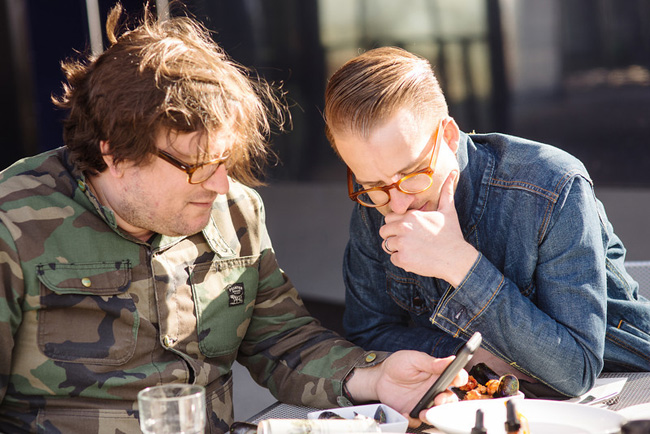
I would start doing ribeyes at 225 degrees, put them in for 7 minutes, take them out and rest them for 7 minutes, and brush them with brown butter and herbs and put them back in for 7, rest them for 7 again… until it’s done. It could take 4 times, or 8 times, or if you’ve got a huge cut of meat, 20 times. But then you slice it, and it’s just like fucking perfect. So I love that sort of thing… you’ll get people coming into the restaurant who think they know a lot about food, and think that meat is cooked sous vide… and it’s not. But it’s perfect… I gotta show you a picture of it. [pulls out phone]
PETE: Do you ever feel a reluctance to divulge a technique, because you don’t want a customer to focus only on that, and enjoy the food without knowing what goes on behind the curtain?
ERIK: When I write a menu, I don’t ever write the techniques. I don’t know why, I just don’t. Let me show you these photos…

PETE: Oh yeah, wow. [The photos show sliced ribeyes, with no gradient of doneness from edge to center — just a perfectly consistent, deep red medium-rare.]
ERIK: Yeah. So that’s at 225. Cook it in intervals, let it rest. It’s pretty cool.
[More food is delivered — mussels with sausage, Korean chicken wings.]
PETE: So here’s a question. Do you ever create something you hate, just because it’s well-liked or popular?
ERIK: That’s a really funny thing, yeah… sometimes I think you have to understand — I mean, 90 percent of the time you’re cooking because you enjoy it — but you also have to understand that it’s a business. Especially a restaurant like this [Sea Change]. Just because you don’t like something doesn’t mean that a thousand other people don’t love it. It takes a certain level of maturity, too, to put that sort of thing behind you, put your ego behind you a bit.
You know, like scallops or something. Seared scallops — I absolutely do not like them at all. I like raw scallops. But seared scallops — it’s like, you wanna sell something? Put fucking seared scallops on the menu. You know what I mean? And I hate it! I absolutely fucking hate it. But just because I have a vendetta against them, you know, doesn’t mean that lots of other people wouldn’t enjoy it, and buy it, so…
PETE: So that’s the crossroads where commerce and art meet, then? Seared scallops!
ERIK: Ultimately, your job is to help make the restaurant a success monetarily.
PETE: So sometimes, you have to put a tuna tartare on the menu.
ERIK: I’d put that on the menu before fucking seared scallops! [laughter]
PETE: I think there’s definitely parallels in the music world… especially when you get investors involved, whether it’s a label for your band or investors in your restaurant… suddenly other people have a say.
ERIK: That brings up another good point about people owning restaurants, like — whoa, those are really good [eating the Korean fried chicken]. I kind of obsess over Korean fried chicken. We’ll make it at home… it’s super awesome.
PETE: Yeah. Man. This is really good.
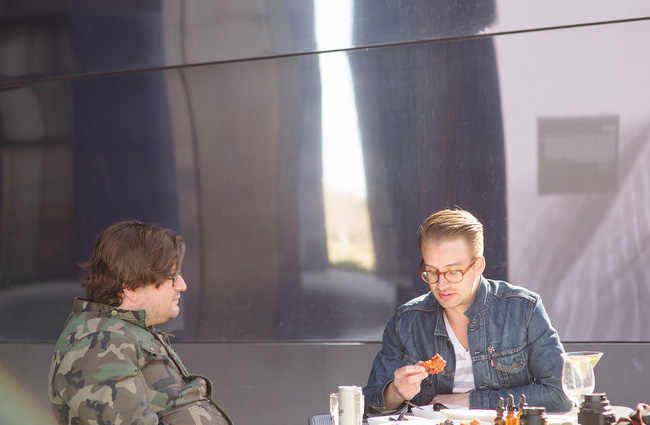
ERIK: Have you ever been to Bian Xian in New York? Korean fried chicken there is like the greatest thing in the world. It’s like super crispy and really spicy, in this bright red glaze — they double fry it. It’s fucking awesome. It’s such a fucking pain in the ass to make at home.
[At this point, the bartender delivers me the full-size version of their White Manhattan.]
PETE: Holy shit.
ERIK: Dude, you’re gonna be wasted. You ever hear about those Basque men’s cooking clubs?
PETE: No!
ERIK: Dude you should Google it. It’s a bunch of men, they get together… these clubs have been going on for like hundreds of years. They’ll get together and watch soccer, you know, and everyone’s responsible for one aspect of the dinner, so they cook, sit down, talk about football or whatever. My friend Michael, the owner of Big Brain Comics, has this idea of kind of doing a lodge — where people hang out, talk about what they do, eat together — a little bit more modern version of like Fred & Barney’s Water Buffalo Lodge, you know? Go home, and if you’re not too wasted, Google those Basque Men’s Cooking Clubs. It’s fascinating!
PETE: Is it just me, or does there seem to be a trend toward that spirit of a more communal feel when it comes to hospitality and cooking? The kind of thing where there’s less of a division between what’s going on, more participatory?
ERIK: Definitely. I personally like eating at the bar. My friends are bar people. You meet people. I love sitting there to eat and hang out.
PETE: I’m a big fan too.
ERIK: And a lot of times you get seated faster… I don’t really fucking care about a table too much.
PETE: My wife and I are into that, for sure. Like at Tilia — it’s super fun to sit at the counter by the open kitchen, and watch the guys cook, and chat. Get a bit more of an insider’s view. Do you feel like your new place will have an open kitchen vibe?
ERIK: Without giving too much away, I’d like to blur the lines a bit between kitchen and dining room. The Catbird Seat — it was the kitchen and seating, together. This will be bigger, but I sort of want to have no differentiation between the front of house and back. I want it to seem like not someone’s house, really, but that feeling that there’s no set break between where the kitchen starts and the dining room starts.
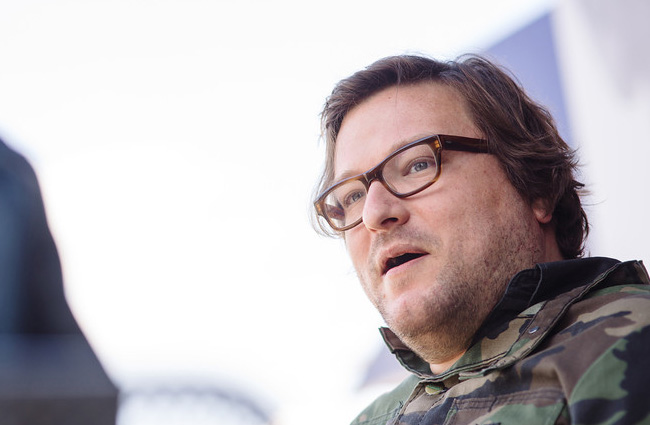
PETE: Maybe this trend of breaking down that 4th wall is permeating all sorts of stuff right now — like on TV, with Louie, and other stuff… things that bend the membrane between internal monologue, traditional narratives, and other people’s perceptions. Maybe the shattering of the expected forms of these sorts of things is bleeding into other cultural things, like food.
ERIK: I like that. Even news, now, the definition of a journalist is changing. You can’t hide behind anything anymore. In Syria it’s just some kid with an iPhone. And what you get from that, you can’t dispute it — there are no filters. That sort of thing fascinates me.
PETE: Is it too much of a stretch to relate this conversation to cooking food? [laughs]
ERIK: It’s funny how talking about opening a restaurant leads to a discussion of war and world politics [laughs]. But yes, to answer the question, I’d like to dive into blurring the lines a bit more in the new place.
PETE: Have you done much foraging, or gotten into that at all?
ERIK: Yeah, a lot of it! That was one of the reasons I wanted to go to Noma… I was doing tons of that before I left. And that’s their thing. I spent 5 months out there. Nashville isn’t great for foraging… it’s a basin, so you don’t get ramps. Very few wild mushrooms in abundance. The Smokies are great for it, though. That’s another reason I’m glad to be back, because I’ve got a couple mushroom spots I like, ramp spots… we’ll start seeing stuff soon if the weather keeps like this. I’ve got a great spot about 20 miles east of Duluth for chanterelles, it’s great. Every year, there’s always shit tons of them. There’s also the bog at Theodore Wirth park, we’d go there every year.
PETE: The Quaking Bog?
ERIK: Oh yeah. It’s great. Right in town. There’s tons of stuff there.
PETE: It’s so surprising, sometimes, the stuff in the city — right under our noses. Boom Island, Theodore Wirth.
ERIK: Yeah, at Noma, we’d go to city parks sometimes — like during lunch, you’d run out of something, get on a bike and go to a city park and pick a bunch of shit. Run back, good to go.
PETE: So you’ve been all over the world — your bona fides are well known. Is there anything in particular here in Minneapolis that fans your flames, keeps you inspired?
ERIK: Well yeah, there’s a reason I came back, you know… I love the cities, I love the seasons, I love the changes… there’s just something about Minneapolis that I’ve fallen in love with, it’s a cool city. It really is. All my really good friends live here. A lot of them are cooks, some of them aren’t. I don’t know — I feel better when I’m here. To me, when it’s nice, the produce is great, there’s wild edible stuff, you know… But it’s also challenging when it’s winter, so that kind of keeps you on your toes, and I like that.
PETE: You’ve got to be able to work within that limited framework. It forces you to be more creative, maybe?
ERIK: Yeah. That’s what Steven [Brown] would always say, that Rimbaud quote: “Within the confines comes the freedom.” It’s always stuck with me, he’d say that a lot. It’s always stuck with me.
PETE: Are you looking long term with the new restaurant?
ERIK: Yeah, I want to create an institution. I want to be here for a long time, make something that’s timeless, without a doubt.
PETE: So you’ve reached a point in your career where a lot of chefs would love to be —
ERIK: What, out of work? [laughs]
PETE: Exactly! But really… with all the awards, accolades, and everything — you’re in a position where you can do a lot. It’s got to be really enjoyable, to be in that position, and bask in the glory a bit —
ERIK: But a lot of that is bullshit.
PETE: OK that’s where I was going — when you strip all that away, what happens? We all love our egos to be inflated. But when that goes away, what does it come down to? What do you want to do?
ERIK: I just want to keep cooking. I do this because I love it. This isn’t a job you can do and not like it. You’re not gonna last. I love it. To me, that’s the best part of it, is just cooking every day. And it’s fun to see what other people do, travel and learn. Like when I travel now I don’t want to go on a typical vacation, like go to a beach or something — I want to go here for this restaurant, or there for that restaurant. The sights are now the restaurants, it’s not about going to see the Statue of Liberty. But at the end of the day, I’m still unemployed! But not for long.
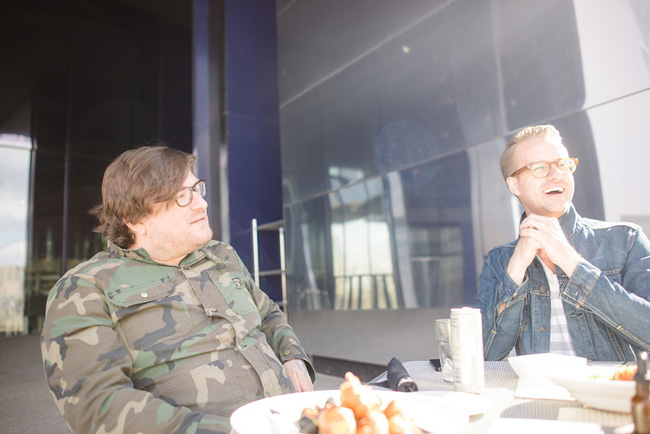

This was a really enjoyable read. Thanks, Peter & Erik!
this is how all interviews should be done…